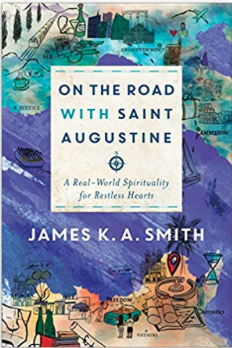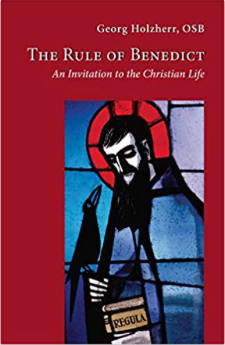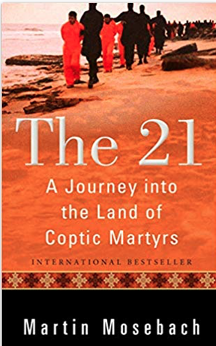posts
|
My reading for the past year tended to support research projects (on hospitality and mission, and suffering and martyrdom). I also enjoyed some rich devotional reading. While much of my reading came in the form of journal articles and book chapters, I also benefited from whole books. In no particular order, these were my favorite reads of 2019.
The Rule of Benedict: An Invitation to the Christian Life (George Holzherr, OSB). During the summer I attended a conference on monasticism and the church to explore how those who are not monks might emulate some monastic rhythms and values. So, for the summer, I read this translation of Benedict’s Rule that also included a very thorough commentary which situated Benedict’s monastic vision and practice within broader monasticism. The Lord’s Prayer: A Guide to Praying to Our Father (Wesley Hill). The second release in Lexham’s Christian Essentials Series, Wesley Hill takes the reader through a meditation on the Lord’s Prayer breaking down each line of it (the invocation, seven petitions, and closing doxology). After several years of using the Our Father as the framework for daily prayer in our home, I was anxious to dig into this. For me the most transformational chapter that has affected by prayer life was petition four, “Give us this day our Daily Bread.” Hill notes that more than a prayer for material provision, it is a reminder to feast on Christ the bread of life (Jn 6:48-51); to allow the Lord Jesus to satisfy our souls with His nourishing presence. This reality is powerfully symbolized when we take the bread during the Eucharist. Hill adds: “In the Eucharist, Jesus puts Himself in our hands so we know exactly where to find Him” (p. 55). On the Road with Saint Augustine: A Real-World Spirituality for Restless Hearts (James K.A. Smith). I’ve been a big fan of Jamie Smith since reading You are What your Love--a game changer in my spiritual life. In this new award-winning back, he does a faithful and concise job of making the pre-modern church father Augustine of Hippo a conversation partner for thinkers (especially existential philosophers), and all spiritual seekers. Augustine’s prodigal journey triggers our reflections on our own prodigality. Smith also rightfully urges a hermeneutic of migration. That is, we are wanderers in this world—existentially or literally—and we ought to read Scripture through these lenses. Though dense in content, the book was engaging, and it was over before I realized it. The 21: A Journey in the Land of the Coptic Martyrs (Martin Mosebach). While researching suffering in the modern global church, I read Mosebach’s careful account of the 21 martyrs (20 Egyptian Copts and one Ghanaian believer) who were executed by ISIS on the beach in Libya in 2015. My heart broke for how these impoverished men, working abroad in Libya to provide for their families back home in Egypt, were brutally murdered. I was inspired by their commitment to the Coptic liturgy, which they sang daily while working in Libya and during their period of captivity. In their suffering and martyrdom, they worshipped. I was also surprised that the Muslim government of Egypt paid to build a church in their honor in their hometown. Remembrance, Communion, and Hope: Rediscovering the Gospel at the Lord’s Table (J. Todd Billings). Billings wrote this to invite the church (particularly his Reformed tradition) to spiritual renewal by a deepened reflection on and practice at the Lord’s Table. He strongly draws upon Calvin’s teaching of the Lord’s real presence in the Supper. I love Billings’ admonition to actively participate in the Eucharist: “The Lord's Supper is more than a mental act of meaning making. It is an embodied practice in community, engaging all our senses in the context of worship” (p. 17). The Eucharist: Sacrament of the Kingdom (Alexander Schmemann). It seemed like every of author I read this year was quoting Schmemann so I decided to go to the source itself. In this classic work, first translated into English in 1987, Schmemann captures the Russian Orthodox theology of the Eucharist. His work is really a street level theology of the Eucharist since he constructed it from his own experience of Eucharistic worship. Schmemann frames the work around the sequential stages of the Liturgy. I especially appreciated the preaching of the gospel during the homily and in the Eucharist itself. Come, Let Us Each Together: Sacraments and Christian Unity (George Kalantzis and Marc Cortez, eds.). This work is the fruit of the 2017 Wheaton Theology Conference—a discussion of the sacraments and Lord’s Table from various church traditions (Protestant, Catholic, Orthodox, free church) and how the global church might arrive at unity around the Lord’s Table. I particularly enjoyed Cherith Fee Nordling’s chapter (pp. 78-93) on Jesus acting as host at the Lord’s Table. Jesus welcomes us at the Table not only as the crucified, buried, and risen Savior, but as the ascended Lord who sits at the right hand of the Father. I also appreciated Paul Gavrilyuk’s call for the Eucharist to unite believers: “As an eschatological sign, the Eucharist has the potential to relativize all forms of existing human alienation; it is a purification of the fallen forms of unity (tribal, national, racial, political) that go against the believers’ new life in Christ (Eph 2:13-14)” (pp. 176-177). |
Archives
November 2023
|



 RSS Feed
RSS Feed
